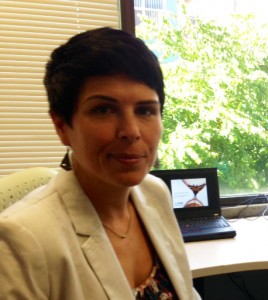Making a difference in suicide prevention
Suicide is, sadly, a big issue in our communities – more so in some than others. But thankfully, we have individuals working hard to make it less of an issue. Two people who are making a difference in suicide prevention on provincial and national scales are Lorraine Grieves, manager of the Prism Transgender Health Information Program, Youth Addictions and Concurrent Disorder Services at VCH and Dammy Damstrom-Albach, a coordinator at SAFER Counselling Service at the Robert and Lily Lee Family Community Health Centre.
Giving back
As a young mother, Lorraine depended on community and health services.
“I accessed a lot of good community support, which helped get me to where I am today,” she says. “It inspired me to get into the field. I got into the idea of giving back because the community support I received was so essential to me becoming a strong person and having a thriving daughter. It could have definitely gone the other way.”
She has used this inspiration to work on a Health Canada funded, provincial LGBT2Q+ substance use prevention initiative called C.A.L.L. Out!, which is pushing for safer spaces in schools for LGBTQ youth and working with families to be more accepting if a young person comes out as queer or transgender.
“Supporting families to be more accepting has a number of positive health outcomes,” she explains. “It helps in substance misuse prevention strategy, an HIV prevention strategy, and in suicide prevention strategy. Youth and families need that support.”
This work has been recognized on a national level with an invitation to present at a national summit in Montreal on preventing LGBT2Q+ suicide.
“C.A.L.L. Out! is unique because it’s so upstream and proactive – it’s looking at interventions that will prevent problems from developing down the road,” Lorraine explains. “If we support youth early, we support families early, make school and communities safer, ultimately we’re getting ahead of suicidality and substance abuse. We hope.”
Building connections
Dammy Damstrom-Albach has been working in suicide prevention since the early 80s. She became involved when, as a UBC student, she volunteered for the school’s first crisis centre called Speak Easy. Since then, she has worked on a national level as president of the Canadian Association for Suicide Prevention where she still works as liaison with a new, Canada-focused group called the National Collaborative For Suicide Prevention, which consists of 40 plus national organizations trying to work more effectively together to reduce the risk of suicide and build suicide-safer communities.
At VCH’s SAFER program, she feels like she and the SAFER Team really make a difference.
“At SAFER, we’re able to build connections with people that they can use as a foundation to make changes in their lives,” she tells me. “We get to see people move from a place where they’re really struggling to a place where they are starting to move forward– starting to figure out what works to build a life they want to live. We get to be part of people growing and moving and making changes, and that can be a pretty positive experience.
Recently, Dammy was invited to a round table hosted by MP Libby Davis on suicide prevention – it’s part of a national initiative called 308 Conversations which encourages Canada’s 308 federal MPs to have conversations with people and stakeholders in their ridings about preventing suicide and to report back on what they learn when they return to Ottawa in the fall.
She sees her involvement and advocacy work in the various levels of suicide prevention – local regional, provincial and national – as complementary.
“It is a bit like one of those Russian dolls,” Dammy says. “While at the most basic level here at SAFER, we mostly work with people on an individual basis it is also clear there are systems changes, processes and policies that would better support those whose lives are touched by suicide and related issues on every level – organizational , regional and provincial. And ideally, all these can be fitted into a system that is supported at the national level as well.”
If you have a concern regarding suicide, either for yourself or someone else, you can reach the SAFER Team at 604-675-3985 from 8:30 to 4:30 Monday to Friday. Afterhours, please call Mental Health Emergency Services at 604-874-7307.


